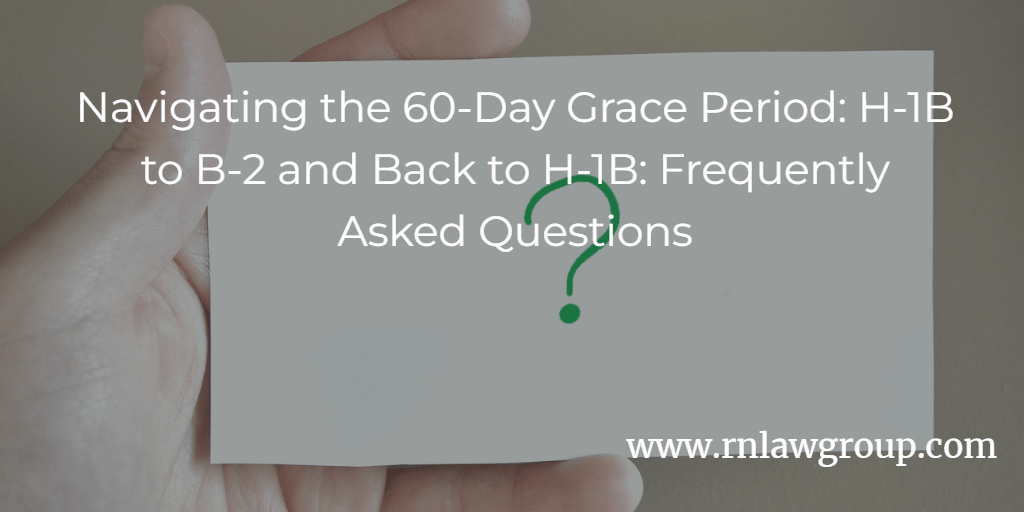
Navigating the 60-Day Grace Period: H-1B to B-2 and Back to H-1B: Frequently Asked Questions
Introduction
The United States is home to a diverse and dynamic workforce, attracting professionals from around the world through various visa programs. One such program is the H-1B visa, which allows skilled workers to temporarily work in the U.S. for sponsoring employers. However, circumstances may arise that require individuals to transition between different visa statuses, leading to questions about the 60-day grace period, particularly in the context of transitioning from H-1B to B-2 and then back to H-1B. In this article, we address frequently asked questions to provide clarity on this intricate process.
Before we discuss the change of status to B-2, first let’s go over some common questions about the B-2 status:
- What is a B-2 status? A B-2 status is a non-immigrant status that allows individuals to remain in the United States temporarily for pleasure or medical treatment. Common purposes include tourism, visiting friends or relatives, participating in social events, or receiving medical treatment.
- How long can I stay in the U.S. on a B-2 status? The initial period of stay on a B-2 status is typically up to six months. However, United States Citizenship and Immigration Services will determine the length of stay based on the specific circumstances of each traveler.
- Can I extend my stay beyond the initial six months? Yes, it is possible to apply for an extension of stay. You must submit the extension application to the United States Citizenship and Immigration Services (USCIS) before your authorized stay expires.
- Can I study on a B-2 visa? No, the primary purpose of a B-2 visa is for pleasure or medical treatment. If you want to study in the U.S., you should apply for a student visa (F-1 or M-1).
- Can I work on a B-2 visa? No, B-2 visa holders are generally not allowed to work in the United States. Limited volunteer activities may be allowed, but any compensated employment is strictly prohibited. Please consult an experienced immigration attorney if you are considering working in the United States.
Now let’s discuss about the change of status from H-1B to B-2 and then back to H-1B:
- What is the 60-Day Grace Period? The 60-day grace period is a provision that allows certain non-immigrant visa holders, including H-1B visa holders, to remain in the U.S. for up to 60 days following the end of their authorized employment period due to being laid off or other reasons for job loss. During this time, individuals are not allowed to work, but they can make arrangements for their departure, apply for a change of status, transfer to a new employer or explore other immigration options.
- Can an H-1B Visa Holder change status to B-2 Status within the 60-Day Grace Period? Yes, H-1B visa holders are allowed to transition to B-2 visitor status within the 60-day grace period. This can be a viable option for individuals who need additional time in the U.S. for personal reasons, such as completing ongoing projects, attending to personal matters, or exploring other job opportunities.
- What is the Purpose of Transitioning to B-2 Status? Transitioning to B-2 status allows individuals to remain in the U.S. for a limited period for non-work-related activities. It provides flexibility for those who find themselves between jobs or need more time to wrap up their affairs in the country.
- Can Individuals Apply for a Change of Status Back to H-1B while the B-2 application is pending? Yes, individuals can apply for a change of status back to H-1B while their B-2 application is pending. This process involves filing a new H-1B change of status petition from ”B-2 pending” to H-1B in premium processing.
- Does the change of status petition from “B-2 pending” to H-1B needs to be filed in Premium Processing? Yes, USCIS guidance specifically mentions that the H-1B petition needs to be filed in premium processing when the B-2 application is pending.
- Can the 60-Day Grace Period be Extended? In general, the 60-day grace period is not extendable. Once the grace period expires, individuals must either depart the U.S., secure a new visa status, or face potential consequences for overstaying.
- What Happens if the Change of Status Petition is Denied? If the change of status petition back to H-1B is denied, individuals must promptly depart the U.S. before the expiration of the 60-day grace period. Failure to do so may result in legal consequences, affecting future immigration prospects.
- Can I work during the 60-day grace period? No, the 60-day grace period is meant for individuals to make arrangements for departure, apply for a change of status, or explore other immigration options. Working during this period is not allowed.
- Can I travel outside the U.S. during the 60-day grace period? Traveling outside the U.S. during the 60-day grace period may jeopardize the ability to return, especially if a change of status petition is pending. It’s crucial to consult with immigration professionals before planning any international travel.
- What are the consequences of overstaying the 60-day grace period? Overstaying the 60-day grace period can result in legal consequences, such as being barred from reentry into the U.S. for a certain period. It can also impact future visa applications and immigration status changes.
Conclusion
Navigating the 60-day grace period from H-1B to B-2 and back to H-1B involves careful planning and adherence to immigration regulations. Understanding the options available and the associated timelines is crucial for individuals seeking a smooth transition between visa statuses. Consider consulting with an experienced immigration attorney that can provide tailored guidance based on your individual circumstances, ensuring a well-informed and compliant process.
By: Felipe Jimenez
Felipe Jimenez is an Associate Attorney at Reddy Neumann Brown PC He works in the H-1B Department where he assists clients through all phases of the non-immigrant visa process.
Reddy Neumann Brown PC has been serving the business community for over 20 years and is Houston’s largest immigration law firm focused solely on US. Employment-based immigration. We work with both employers and their employees, helping them navigate the immigration process quickly and cost-effectively.

